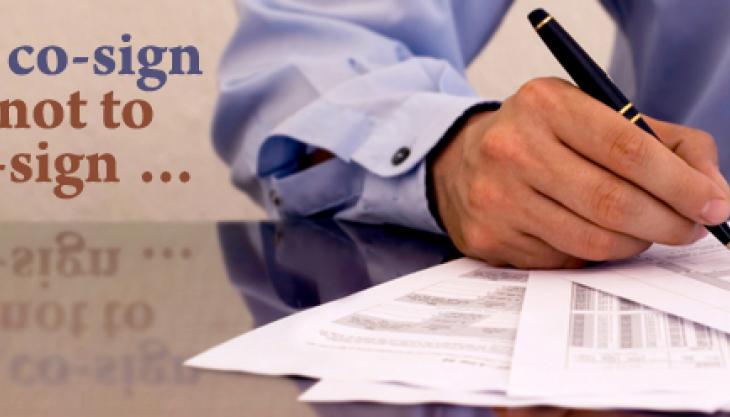Protecting Co-Signers During a Bankruptcy
Submitted by Rachel R on Sat, 05/25/2013 - 12:56am

Image Source: arizona-bankruptcy-laws.com
During some point in your life, you may need someone to co-sign a loan with you. Without a solid and established credit history to go on, many lenders will require that you have a co-signer before they hand over the money. According to some estimates, around 10 percent of all borrowers will need a co-signer to qualify for a loan.
There are multiple circumstances that may warrant a co-signer. For example, you may be fresh out of college and entering into the workforce for the first time or maybe you ran into financial difficulties that have affected your credit score negatively. No matter the reason, co-signers can be a real life saver when you can’t qualify for a loan by yourself.
A co-signer is usually one of your friends, a spouse or a close family member. They typically have a well-established credit history, which is key to helping you qualify for a loan. When co-signing with you, they agree to be responsible for the debt in the event you cannot afford the payments. It is a legal obligation made by the co-signer, who is often called a “co-debtor” in bankruptcy proceedings.
Image Source: money.cnn.com
When you make the decision to file for bankruptcy protection, it will affect both you and your co-signer. It is vital to understand that the debt relief you are granted under bankruptcy laws are only provided to you, as it is an individual bankruptcy case. Your parent, friend or spouse will still be legally responsible for the loan they co-signed for you. For example, if a husband and wife hold a joint credit card together and only the wife files for bankruptcy, the credit card company can still hold the husband liable for the debt and pursue them for payment.
In order to understand the bankruptcy laws and processes, let’s examine how Chapter 7 and Chapter 13 bankruptcies affect a co-signer.
When you file for Chapter 7 bankruptcy protection in North Carolina, all of your eligible debts are discharged. After completing the process, you are protected from your creditors and they can no longer pursue you for payment of the debts. While you enjoy these privileges, your co-signer does not. On each debt that a co-signer legally agreed to be responsible for, lenders can still pursue collection efforts, make payment demands and file a lawsuit against the co-signer.
Image Source: gogulfwinds.com
If you choose to file a Chapter 13 bankruptcy in North Carolina, things are quite a bit different when it comes to the co-signer’s protection under bankruptcy laws. In a Chapter 13 bankruptcy case, there is what’s called a temporary “co-debtor stay” for all consumer debt. When you are the one filing for Chapter 13 bankruptcy protection, the Court enters an “Order of Relief” that stops creditors from continuing with any effort to collect the debt. Under a Chapter 13 bankruptcy, that order actually protects both you and your co-signer.
For the complete duration of your Chapter 13 bankruptcy case, which is usually three to five years, creditors are not allowed to engage in any collection efforts against your co-signer. Once the bankruptcy process is finished, however, the co-debtor stay is lifted and your co-signer is essentially right back where they started if you have not paid off the debt.
If you are considering filing for bankruptcy protection, but are worried about how it will negatively affect your co-signer, it is vital to speak with an experienced North Carolina bankruptcy attorney. They will assess your options and show you how a Chapter 13 bankruptcy can help you obtain debt relief while protecting your co-signer in the process.
Dedicated to helping residents of North Carolina find the best solutions to their debt problems. Don’t waste another day worrying about your debt. Call +1-833-627-0115 today to schedule a free initial consultation to discuss your bankruptcy options.
Debts Hurt! Got debt? Need help? Get started below!
Serving All of North Carolina
- Bankruptcy Attorneys Raleigh NC (North)
- Bankruptcy Attorney Fayetteville NC
- Bankruptcy Attorney Durham NC
- Bankruptcy Attorneys Wilson NC
- Bankruptcy Attorneys Greensboro NC
- Bankruptcy Attorneys Southport NC
- Bankruptcy Attorneys Wilmington NC
Bankruptcy Attorneys Raleigh NC (North)
6616 Six Forks Rd #203 Raleigh, NC 27615 North Carolina
Tel: (919) 847-9750

Bankruptcy Attorney Fayetteville NC
2711 Breezewood Ave Fayetteville, NC 28303 North Carolina
Tel: (910) 323-2972

Bankruptcy Attorney Durham NC
1738 Hillandale Rd Suite D Durham, NC 27705 North Carolina
Tel: (919) 286-1695


Bankruptcy Attorneys Greensboro NC
2100 W Cornwallis Dr. STE O Greensboro, NC 27408 North Carolina
Tel: (336) 542-5993

Bankruptcy Attorneys Southport NC
116 N Howe St. Suite A Southport, NC 28461 North Carolina
Tel: (910) 218-8682

Bankruptcy Attorneys Wilmington NC
116 N. Howe Street, Suite A Southport, NC 28461 North Carolina
Tel: (910) 447-2987
